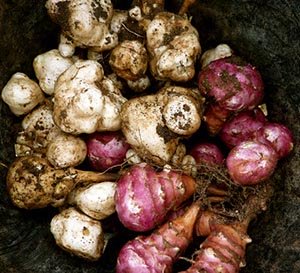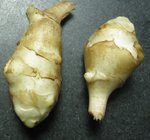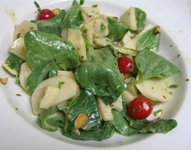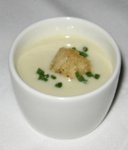Jerusalem artichoke Nutrition facts
Jerusalem artichoke is a bumpy, fleshy, root vegetable of sunflower family plants. It's underground nutty, flavorful, the starch-rich root is eaten much the same way as potato in many parts of Western Europe and Mediterranean regions.
It should not be confused to globe artichoke, which is an edible flower bud. Similarly, their name is widely misunderstood as “artichokes from Jerusalem” misinterpreted for the Italian girasole carciofi, translating to sunflower artichoke in English. Some of the common names are sunroot, sunchoke, topinambur etc. Scientific name: Helianthus tuberosus.
 |
| Fresh harvest; pink and brown jerusalem artichokes. Photo courtesy: net_efekt. |
Jerusalem artichokes are native to Central America. The plant is technically an evergreen perennial but cultivated as an annual crop. Once established, it grows vigorously reaching about 5-10 feet in height slightly taller than the sunflower plant with multiple branches. Many golden-yellow flower heads appear at the terminal end of branches.
Sunchoke produces numerous starchy, edible rhizomes that are firmly attached to the stem, underneath the soil surface. The tubers feature gray, purple, or pink skin externally; and sweet, delicate textured ice-white meat inside. Some roots have a quite bumpy and extremely knobby outer surface making their cleaning a tougher task. Each tuber weighs about 75 to 200 g.
Health benefits of Jerusalem artichoke
Jerusalem artichoke is moderately high in calories; provides about 73 calories per 100 g, roughly equivalent to that of potatoes.
The root has negligible amounts of fat and contains zero cholesterol. Nevertheless, its high-quality phytochemical profile comprising of dietary fiber (non-starch carbohydrates), and antioxidants in addition to small proportions of minerals, and vitamins.
It is one of the finest sources of dietary fibers, especially high in oligo-fructose inulin, which is a soluble non-starch polysaccharide. The root provides 1.6 mg or 4% of fiber. Inulin should not be confused for insulin, which is a hormone.
Inulin is a zero-calorie saccharine and inert carbohydrate which does not undergo metabolism inside the human body, and thereby branding this tuber as an ideal sweetener for diabetics and dietetics.
Soluble as well as insoluble fibers in sunchoke add up to the bulk of food by retaining moisture in the gut. Studies suggest that adequate roughage in the diet helps reduce constipation problems. Dietary Fibers also offer some protection against colon cancers by eliminating toxic compounds from the gut.
This vegetable contains small amounts of anti-oxidant vitamins such as vitamin-C, vitamin-A, vitamin-E. These vitamins, together with flavonoid compound like carotenes, helps scavenge harmful free radicals and thereby offers protection from cancers, inflammations, and viral cough and cold.
Further, Jerusalem artichoke is a moderate source of minerals and electrolytes, especially potassium, iron, and copper. 100 g of fresh root holds 429 mg or 9% of daily required levels of potassium. Potassium is a heart-friendly electrolyte that brings a reduction in blood pressure and heart rate by countering the pressing effects of sodium.
100 g of fresh sunchoke contains 3.4 mg or 42.5% of iron, probably the highest amount of this trace element among some common edible roots and tubers.
It also contains small levels of some of the valuable B-complex group of vitamins such as folates, pyridoxine, pantothenic acid, riboflavin, and thiamin.
| Principle | Nutrient Value | Percent of RDA |
|---|---|---|
| Energy | 73 Kcal | 3.7% |
| Carbohydrates | 17.44 g | 13% |
| Protein | 2 g | 4% |
| Total Fat | 0.01 g | <1% |
| Cholesterol | 0 mg | 0% |
| Dietary Fiber | 1.6 g | 4% |
| Vitamins | ||
| Folates | 13 µg | 3% |
| Niacin | 1.3 mg | 8% |
| Pantothenic acid | 0.397 mg | 8% |
| Pyridoxine | 0.077 mg | 6% |
| Riboflavin | 0.060 mg | 4.5% |
| Thiamin | 0.200 mg | 17% |
| Vitamin A | 20 IU | <1% |
| Vitamin C | 4 mg | 7% |
| Vitamin E | 0.19 mg | 1% |
| Vitamin K | 0.1 µg | <1% |
| Electrolytes | ||
| Sodium | 4 mg | <1% |
| Potassium | 429 mg | 9% |
| Minerals | ||
| Calcium | 14 mg | 1.4% |
| Copper | 0.140 mg | 15% |
| Iron | 3.40 mg | 42.5% |
| Magnesium | 17 mg | 4% |
| Manganese | 0.060 mg | 2% |
| Selenium | 0.7 µg | 1% |
| Zinc | 0.12 mg | 1% |
| Phyto-nutrients | ||
| Carotene-ß | 12 µg | -- |
| Carotene-α | 0 µg | -- |
| Lutein-zeaxanthin | 0 µg | -- |
Selection and storage
 |
| Cleaned sunchokes. Photo courtesy: mlinksva |
Sunchokes are commonly found in the US markets year-round. Fresh farm harvest hit the markets from October and may last until the winter and spring seasons. In the stores, buy tubers with a smooth surface as they pose less difficulty in the preparation. Look for average-sized, clean, firm tubers. Avoid any sprouted, diseased, or bruised roots.
Once at home, store them in the refrigerator set at 33 to 35 degrees F, and at very high relative humidity.
Preparation and serving methods
Wash the tubers thoroughly in cold water with a gentle scrub. Although peel is fine to eat, it is discarded using a vegetable-peeler. The root artichokes are high in iron content, and cut ends turn brown soon upon exposure to air, as in apples. To prevent this, drop cut pieces into a bowl of cold acidulated (lemon) water.
Jerusalem artichokes are one of the very versatile vegetables. The tubers can be employed in a variety of ways in cooking. They can be eaten raw like parsnips in salads or boiled and mashed, roasted, or sauteed like a potato. Do not overcook, as they turn soft and mushy rather quickly.
Here are some serving tips:
 |
 |
| Fava greens with radishes, almonds, and sunchokes. Photo courtesy: benketaro |
Cold sunchoke soup. Photo courtesy: Arnold Gatilao |
Fine julienned tuber can be a great addition to salads or slaws.
Deep-fry its thin slices in vegetable oil (as in potato chips) to prepare chips.
Boiled sunchoke can be pureed, and can be used as a dip or in fillings for pancakes.
It complements well with other tubers like a potato in a variety of mouth-watering stews and soups. Roasted sunchoke is eaten as a side dish with turkey, lamb, etc.
Safety profile
Jerusalem artichoke contains inert carbohydrates in the form of inulin. Inulin does not get digested in the gut and passes as it is in the bowel movements. Sometimes, this may cause troublesome indigestion problems, especially in those who are new to use them in the food. Eating a large quantity of roughage may cause gaseous distension and gripping pain in the stomach. (Medical disclaimer).
Read further..
≻≻ What are the best foods for controlling appetite?
≻≻-Back to Vegetables from Jerusalem artichoke. Visit here for an impressive list of vegetables with complete illustrations of their nutrition facts and health benefits.
≻≻-Back to Home page.
Further resources: